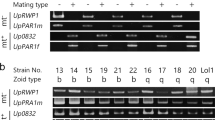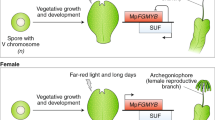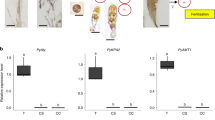Abstract
ALTHOUGH ferns have in a few instances shown some irregularities in the development of the haploid and diploid generation, such as appertain to apogamy and apospory, there has so far been little concrete evidence to homologise the sexual organs (or their content) with sporangia (or their spores) in ferns. The fact that spermatozoids have now been found in normal sporangia of Scolopendrium vulgare may thus be of some interest from the phylogenetic point of view and may throw more light on the alternation of generations, which in ferns is of such a stable and characteristic type.
This is a preview of subscription content, access via your institution
Access options
Subscribe to this journal
Receive 51 print issues and online access
$199.00 per year
only $3.90 per issue
Buy this article
- Purchase on Springer Link
- Instant access to full article PDF
Prices may be subject to local taxes which are calculated during checkout
Similar content being viewed by others
References
Andersson-Kottö, I., Svensk Bot. Tidskr., 26, Hft. 1–2 ; 1932.
Author information
Authors and Affiliations
Rights and permissions
About this article
Cite this article
GAIRDNER, A. Sporangia containing Spermatozoids in Ferns. Nature 131, 621–622 (1933). https://doi.org/10.1038/131621b0
Issue Date:
DOI: https://doi.org/10.1038/131621b0
This article is cited by
-
Fern gametophytes as experimental material
The Botanical Review (1968)
-
Apogamy, apospory, and parthenogenesis in the Pteridophytes
The Botanical Review (1939)
-
The external mechanics of the chromosomes, VII. Abnormal mitosis in the pollen-grain
Chromosoma (1939)
Comments
By submitting a comment you agree to abide by our Terms and Community Guidelines. If you find something abusive or that does not comply with our terms or guidelines please flag it as inappropriate.



